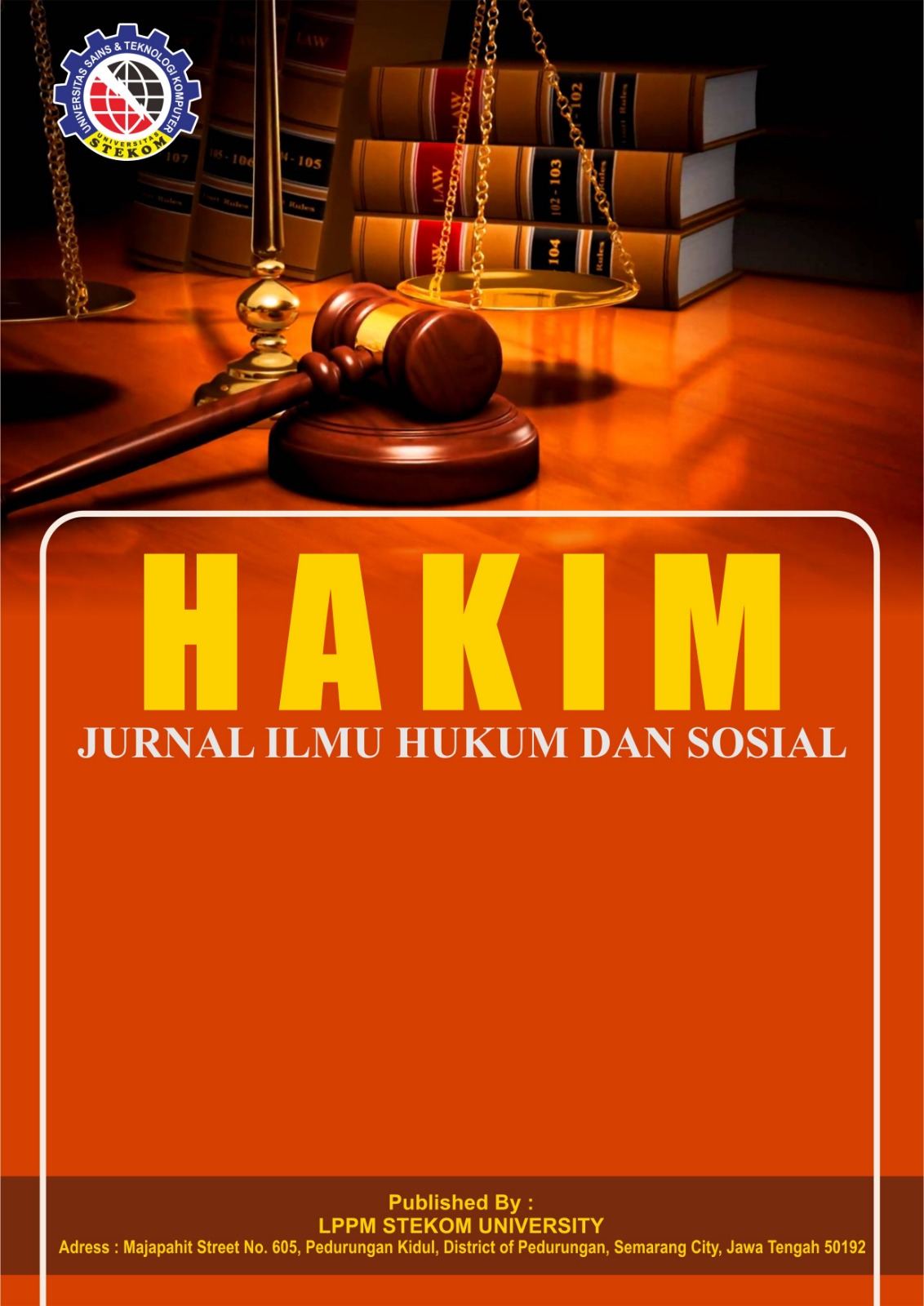Copyright Protection in the NFT Ecosystem: Legal Challenges and Policy Recommendations for Indonesia
DOI:
https://doi.org/10.51903/hakim.v3i1.2299Keywords:
NFT , Copyright Protection , Digital Rights Regulation , Digital Law , BlockchainAbstract
Non-Fungible Tokens (NFTs) present significant opportunities for the creative industry in digitizing and monetizing artistic works. However, a major challenge arises in copyright protection, particularly in Indonesia, which has yet to establish specific regulations addressing NFTs within its intellectual property (IP) law framework. Currently, legal protection relies on Law No. 28 of 2014 on Copyright, which does not fully accommodate the characteristics of blockchain technology. This study aims to analyze copyright protection in Indonesia's NFT ecosystem, compare it with regulatory frameworks in the United States and the European Union, and provide policy recommendations that are more adaptive to the advancement of digital technology. The research adopts a normative juridical approach, incorporating comparative legal analysis and empirical studies through interviews with 15 key stakeholders, including digital artists and legal practitioners. The findings indicate that 78% of respondents perceive Indonesia’s current regulatory framework as ineffective in protecting NFT copyrights, whereas regulatory developments in the United States and the European Union have successfully reduced NFT copyright disputes by 40% over the past five years. Additionally, an analysis of 30 NFT-related disputes on OpenSea and Rarible reveals that 65% of cases involve copyright claims that cannot be effectively resolved through national legal mechanisms. This study recommends implementing a takedown notice mechanism, integrating smart contracts for creator royalties, and strengthening digital arbitration frameworks within Indonesia’s legal system. With clearer regulations, Indonesia’s NFT ecosystem is expected to develop with stronger legal protections for digital content creators
References
Aseeva, A. (2023). Liable and Sustainable by Design: A Toolbox for a Regulatory Compliant and Sustainable Tech. Sustainability, 16(1), 228. https://doi.org/10.3390/su16010228
Bhujel, S., & Rahulamathavan, Y. (2022). A Survey: Security, Transparency, and Scalability Issues of NFT’s and Its Marketplaces. Sensors, 22(22), 8833. https://doi.org/10.3390/s22228833
Bonnet, S., & Teuteberg, F. (2023). Impact of Blockchain and Distributed Ledger Technology for the Management of the Intellectual Property Life Cycle: A Multiple Case Study Analysis. Computers in Industry, 144, 103789. https://doi.org/10.1016/j.compind.2022.103789
Cappai, M. (2023). The Role of Private and Public Regulation in the Case Study of Crypto-Assets: The Italian Move Towards Participatory Regulation. Computer Law and Security Review, 49, 105831. https://doi.org/10.1016/j.clsr.2023.105831
Chalmers, D., Fisch, C., Matthews, R., Quinn, W., & Recker, J. (2022). Beyond the Bubble: Will NFTs and Digital Proof of Ownership Empower Creative Industry Entrepreneurs? Journal of Business Venturing Insights, 17, 00309. https://doi.org/10.1016/j.jbvi.2022.e00309
Dharma, D. S. (2023). Regulating the Metaverse: Ensuring Legal Protection and Intellectual Property Rights in the Digital Landscape. Indonesian Law Journal, 16(2), 161–184. https://doi.org/10.33331/ilj.v16i2.131
Dowdeswell, T., & Goltz, N. (2023). NFTs and the Enclosure of the Digital Realm. Information & Communications Technology Law, 32(2), 149–169. https://doi.org/10.1080/13600834.2022.2113435
Gao, Y., Xie, X., & Ni, Y. (2023). Evolutionary Game Analysis of Copyright Protection for NFT Digital Works Considering Collusive Behavior. Applied Sciences, 13(20), 11261. https://doi.org/10.3390/app132011261
Grba, D. (2023). Faux Semblants: A Critical Outlook on the Commercialization of Digital Art. Digital, 3(1), 67–80. https://doi.org/10.3390/digital3010005
Handono, M., Widiyanti, I. D., & Andini, P. P. (2023). Dispute Resolution for Non-Fungible Token (NFT) Businesses in Indonesia. International Journal of Social Science and Education Research Studies, 3(8), 1519–1526. https://doi.org/10.55677/ijssers/v03i8y2023-02
Jia, W., & Yao, B. (2023). NFTs Applied to the Art Sector: Legal Issues and Recent Jurisprudence. Convergence: The International Journal of Research into New Media Technologies, 30(2), 807–822. https://doi.org/10.1177/13548565231199966
Jo, H., & Shin, S. A. (2024). Investigating Viewer Engagement in Esports Through Motivation and Attitudes Toward Metaverse and NFTs. Scientific Reports, 14(1), 1–14. https://doi.org/10.1038/s41598-024-70847-z
Kim, D., & Kokuryo, J. (2024). Establishing Altruistic Ethics to Use Technology for Social Welfare-How Japan Manages Web3 and Self-Sovereign Identity in Local Communities. Electronic Markets, 34(1), 1–12. https://doi.org/10.1007/s12525-023-00684-x
Kurniawan, I. D. (2024). Tantangan Hukum dalam Penyelesaian Sengketa E-commerce: Pendekatan Arbitrase dan Litigasi. AL-MIKRAJ Jurnal Studi Islam Dan Humaniora, 4(2), 554–566. https://doi.org/10.37680/almikraj.v4i02.4796
Lee, M.-F., Li, J.-T., Lin, W.-R., & Wang, Y.-H. (2025). Evaluation of Digital Asset Investment Platforms: A Case Study of Non-Fungible Tokens (NFTs). AppliedMath, 5(1), 3. https://doi.org/10.3390/appliedmath5010003
Lim, E. C. (2024). Finding Nemo: Digital Art, Tokenised Assets, Virtual Property and the Right of Communication in Copyright Law. Journal of World Intellectual Property, 27(1), 69–87. https://doi.org/10.1111/jwip.12290
Liu, Y., Xin, B., & Xie, L. (2025). Strategic NFT Adoption to Combat Digital Piracy. Technovation, 141, 103183. https://doi.org/10.1016/j.technovation.2025.103183
López-Pimentel, J. C., Morales-Rosales, L. A., Algredo-Badillo, I., & Del-Valle-Soto, C. (2023). NFT-Vehicle: A Blockchain-Based Tokenization Architecture to Register Transactions over a Vehicle’s Life Cycle. Mathematics, 11(13), 1–29. https://doi.org/10.3390/math11132801
Madine, M., Salah, K., Jayaraman, R., & Zemerly, J. (2023). NFTs for Open-Source and Commercial Software Licensing and Royalties. IEEE Access, 11, 8734–8746. https://doi.org/10.1109/access.2023.3239403
Ness, S. (2024). VAT/GST Harmonisation Challenges for Digital Assets Such as Bitcoin and NFTs in the EU Following Case C-264/14 (Skatteverket v David Hedqist). In International Cybersecurity Law Review (Vol. 5, Issue 3). https://doi.org/10.1365/s43439-024-00124-2
Pinandito, K., & Irianto, N. (2023). Digital Asset And Personal Data Protection in the Metaverse: Analyzing the Implementation of Indonesian Laws in Addressing Challenges in the Virtual Era. Indonesian Law Journal, 16(2), 137–159. https://doi.org/10.33331/ilj.v16i2.130
Quiñones Vilá, C. S. (2023). A Brave New World: Maneuvering the Post-Digital Art Market. Arts, 12(6), 240. https://doi.org/10.3390/arts12060240
Raudah. (2024). Aspek Hukum dalam Pengelolaan Digital Asset dan NFT. Indragiri Law Review, 2(3), 55–63. https://doi.org/10.32520/ilr.v2i3.37
Wang, R., Lee, J. A., & Liu, J. (2024). Unwinding NFTs in the Shadow of IP Law. American Business Law Journal, 61(1), 31–55. https://doi.org/10.1111/ablj.12237
Zhu, K. ;, Wu, F. ;, Wang, F. ;, Shen, T. ;, Wu, H. ;, Xue, B. ;, Liu, Y., Odintsov, S., Zhu, K., Wu, F., Wang, F., Shen, T., Wu, H., Xue, B., & Liu, Y. (2024). Blockchain-Based Digital Asset Circulation: A Survey and Future Challenges. Symmetry, 16(10), 1287. https://doi.org/10.3390/sym16101287
Zou, L., & Chen, D. (2024). Using Blockchain Evidence in China’s Digital Copyright Legislation to Enhance the Sustainability of Legal Systems. Systems, 12(9), 356. https://doi.org/10.3390/systems12090356











3.png)
